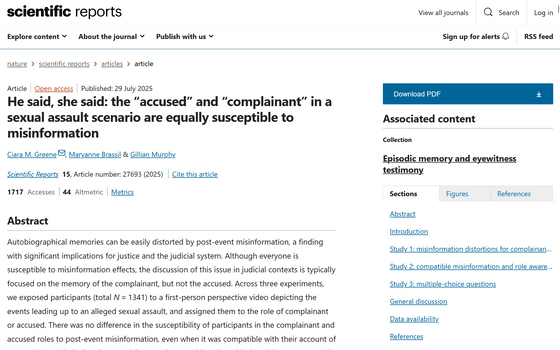In sexual assault cases, victims and suspects are equally prone to 'confusing memories'

In sexual assault cases, eyewitness testimony and the testimony of suspects and victims are often considered strong evidence, but these memories are easily distorted by external information, and it has been found that both victims and suspects are prone to the same level of memory confusion.
He said, she said: the “accused” and “complainant” in a sexual assault scenario are equally susceptible to misinformation | Scientific Reports

Defendants in sexual assault cases are just as likely to misremember the event as alleged victims – new study
Ciara Green and her colleagues at University College Dublin conducted an experiment in which subjects watched videos of dating scenes filmed from a first-person perspective, giving them a simulated dating experience.
After watching the video, participants were told that a sexual assault had been alleged, randomly assigned to the roles of victim or suspect, and presented with several third-party witness accounts, some of which were intentionally misleading, such as security guards, bartenders, and taxi drivers saying the suspect had forced alcohol on the victim or that the victim was sexually promiscuous.
Afterwards, the subjects were given a questionnaire to assess how much of the date they remembered and how much they were influenced by third-party witness testimony, and memory errors were measured for both the victim and the suspect.
The results showed that both those assigned the victim role and those assigned the suspect role were equally susceptible to misinformation.

'Most people think of memories as something as simple as accessing a computer file, but we actually reconstruct them like building a Lego tower. We don't recall the entire event. This reconstruction is prone to error, and sometimes we incorporate incorrect information into our memories,' Green said.
According to Green, when trials rely on victim or witness memory, experts are sometimes called in to explain the reliability of those memories to the jury. In sexual assault cases, these experts tend to be almost always called by the defense, not the prosecution, and are often used to point out that the witness or victim's memory may be faulty, motivated by the desire to reduce eyewitness error and avoid wrongful convictions.

'This leaves witnesses and victims vulnerable to memory errors, while giving the impression that suspects' memories are infallible,' Green said. 'Eyewitness memories should be treated like any other evidence, but with the understanding that they can easily be contaminated.'
Related Posts:
in Science, Posted by log1p_kr







